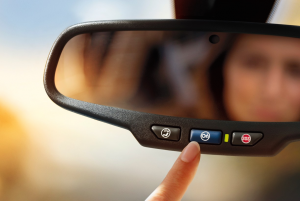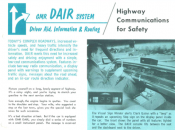OnStar
|
Contents
History
Beginning
Conceived and developed within General Motors dating back to the 1960s, OnStar is touted as being the way of the future when it comes to interacting with one's automobile.[1]. The origin for the concept of OnStar can be found in the creation of the Driver Aid, Information, and Routing (DAIR) System. The technology was unveiled in two prototype vehicles in 1966 and was capable of providing basic turn-by-turn directions to drivers while also providing feedback to the drivers regarding current road conditions and relaying up-to-date accident reports. The project was brought to an end when it was shown that the overhaul to the American roadway system that would be needed for the product to work reliably and nationally would be be virtually impossible to accomplish.[1]
Evolution
A similar concept to the DAIR System began it was discovered that GPS and wireless communication methods provided the core goals of the DAIR System without completely reworking roadway systems.[1] The current iteration of OnStar was officially unveiled at the 1996 Chicago Auto Show and was first made available in 1997 Cadillac vehicles. The system was able to connect drivers to 24/7 OnStar concierges who could provide turn-by-turn directions as well as emergency assistance in times of need. The system was advertised as the "world's first in-vehicle, hands-free communication system".[1] In 2001, OnStar added the ability for drivers to place personal calls, access their email, and hear the latest news broadcasts through their OnStar systems.[1]
Current Status
Today, OnStar offers a multitude of services to its subscribers. Those services can be grouped under five main types of service: emergency, security, navigation, mobile connectivity, and vehicle maintenance monitoring. OnStar is able to call emergency professionals when a user has an accident, unlock the car for users that accidentally locked their keys within it, provide navigation routes that avoid accidents or traffic jams, provide internet access for users on-the-go, and tell users when and why their vehicle is malfunctioning.[2]
Overview of Services
Emergency Services [3]
- Automatic Crash Response: If users are involved in an accident, built-in sensors will automatically alert OnStar officials and predict severity based upon the sensor findings. An OnStar official will then automatically check in with the driver to see if they need help and alert emergency professionals of the accident and its location if additional assistance is required.
- Emergency Assistance: If users press the red emergency button, they will be instantly connected with an OnStar official who can provide critical emergency help while also notifying other emergency personal of the user's location and the issue that they are facing.
- Crisis Assist: If a user finds themselves in a perilous situation, OnStar advisors can provide them with emergency resources, escape routes, and/or a contact family member. Examples in which a user may require Crisis Assistance are severe weather, natural resource/man-made disasters, and natural disasters.
- Roadside Assistance: Roadside assistance can provide more generic service help, such as a lockout service, emergency towing, flat tire changing services, battery jump start services, and emergency fuel delivery services.
Security Services [4]
- Remote Ignition Block: If a vehicle has been reported stolen, OnStar can send a remote signal that will stop the engine from starting.
- Stolen Vehicle Slowdown: If a car has been reported stolen, a signal will be sent to the authorities to help recover the vehicle and reduce high-speed pursuits. Once the police have confirmed that the conditions are safe, OnStar will send a signal that gradually slows down the vehicle so it can be apprehended by the authorities.
- Theft Alarm Notification: If the car alarm goes off, OnStar can notify the owner of the vehicle immediately via text, email, or phone call to quickly and safely recover the vehicle.
- Turn-By-Turn Directions: OnStar can also send turn-by-turn directions to a user's in-vehicle navigation system through the use of the user's vehicle’s mobile app. Drivers can also use Destination Download, in which they push a button to contact OnStar officials who will find turn-by-turn directions to the point of interest and send those directions to the in-vehicle navigation system.
- AtYourService: This service is is a new way to discover value in the places a user goes, providing an overall better user experience with suggestions on where to eat, shop, and play. When users are not driving, they can get valuable offers delivered directly to their vehicle’s mobile app. OnStar officials can also help users find and book a hotel room through Priceline.com.
Mobile Connectivity Services [6]
- OnStar 4G LTE & Wi-Fi Hotspot: With the new offering of OnStar 4G LTE, users can connect up to to seven devices (including tablets and laptops) at 4G LTE speed. This also makes a user's car into its own Wi-Fi hotspot.
- Hands-Free Calling: OnStar also offers a built-in wireless service so users can stay connected when their cell phone does not have service or is not on their person.
- Access to Third-Party Applications and Services: OnStar has also connected with select third party providers of apps and services so that they can offer users innovative and personalized features.
Vehicle Maintenance Monitoring Services [7]
- Diagnostic Reports: Every month, OnStar can run a thorough check of a user's vehicle's engine, transmission, anti-lock brakes and more, and email over the results. With Dealer Maintenance Notifications, a user's car will email the diagnostics report to the dealer if it is time for the vehicle to have maintenance service done, and the dealer will contact the user to set up a service appointment. With Proactive Alerts, the vehicle can predict potential issues with key vehicle components and send alerts via email and/or text. Diagnostic Alerts allows users to set their preferences to receive a monthly diagnostic report or be notified of the vehicle’s condition in real-time via email and/or text.
- OnStar Smart Driver: With OnStar Smart Driver, users will receive information about their driving behavior and tips on becoming a smarter driver. Users also have the potential to qualify for insurance discounts from participating providers.
- Remote Access: With the Remote Access mobile app, users can start their engine, lock and unlock doors, honk the horn, and flash the lights from almost anywhere.
- Location Manager: The Location Manager service allows users to know where their vehicle is at all times. With the Location Manager service, users have the Family Link service. With the OnStar app, the Family Link service will allow users to see where their vehicle is and receive email and/or text alerts about its location at specific times. The Location Manager service also has a Vehicle Locate function, which allows users to easily look-up their vehicle’s location on a map.
Ethical Concerns
Location Tracking
OnStar tracks the location of OnStar-equipped vehicles to provide navigation and emergency services. Although location tracking is necessary for drivers who want to take full advantage of OnStar’s capabilities, there are privacy concerns associated with the consistent tracking of a vehicle’s movement. In 2011, OnStar notified drivers that it would begin collecting this data even after drivers stop using the service.[8] Drivers must notify the company if they want to sever this connection.[8] This updated privacy policy also stated that OnStar reserves the right to anonymize this data and sell it to third parties.[8] In 2012, OnStar rolled out “Family Link”, a service that allows owners of vehicles with OnStar to track their family members’ location through the OnStar website and to receive email and text alerts about their location at specific times or locations.[9] This raises concerns about privacy infringement surrounding location tracking of drivers who are currently using or have previously used the service.
Hacking
OnStar-equipped vehicles, like all things with an IP address, are vulnerable to hacking. This requires increased staff and resources to ensure these vehicles remain secure.[10] Although OnStar doesn’t handle the control systems of vehicles, successful hacking of the diagnostic and location-based information it does handle could be dangerous for drivers. In 2015, Charlie Miller and Chris Valasek successfully hacked a Jeep Cherokee by sending commands through the vehicle’s entertainment system to its control systems.[11] They were able to do anything from blasting the air conditioning to cutting the vehicle’s brakes.[11] A well-known hacker, Samy Kamkar, has successfully hacked OnStar-equipped GM vehicles using the RemoteLink mobile app.[12] Kamkar was able to locate, unlock, and start these vehicles, but he had to be relatively close to the vehicle for this hacking to be successful.[12]
Case Study
In 2014, a woman in Campbell crashed her Chevorlet Cruze down a mountain, leaving her in bad shape. Her car had OnStar installed and therefore the car was able to send information to a specialist quickly to notify authorities that a crash had occurred. However, there was a big issue related to how authorities could respond to this accident--the location sent by OnStar was 15 miles off. Although eventually the woman was found and saved due to technology in her iPhone, it is unfortunate how the OnStar technology was unable to successfully complete the job it was made for. However, this technology has made improvements in how quickly authorities are able to reach accidents and respond to them, resulting in a higher rate of survivals. Additionally, this technology allows information to be extracted and delivered quickly without much assistance from the driver. Before this technology existed, authorities had to rely on maps, phone calls, and word of mouth information making it more difficult to provide assistance when it is needed. [13] Although OnStar technology has not been perfected as of yet, this case is an example of how different information technologies work together. OnStar was able to successfully send a signal notifying the necessary agents about the crash, while technology on the iPhone was able to pinpoint exactly where the victim was.
References
- ↑ 1.0 1.1 1.2 1.3 1.4 "The Origins of OnStar.", Featured: The Origins of OnStar. GM Heritage Center, n.d. Web. 18 Apr. 2017.
- ↑ "OnStar Help & Support|OnStar.", OnStar. N.p., n.d. Web. 16 Apr. 2017.
- ↑ "Emergency.", Emergency|OnStar. OnStar, n.d. Web. 18 Apr. 2017.
- ↑ "Security.", Security|OnStar. OnStar, n.d. Web. 18 Apr. 2017.
- ↑ "Navigation.", Navigation|OnStar. OnStar, n.d. Web. 18 Apr. 2017.
- ↑ "Connections", Connections|OnStar. OnStar, n.d. Web. 18 Apr. 2017.
- ↑ "Vehicle Manager", Vehicle Manager|OnStar. OnStar, n.d. Web. 18 Apr. 2017.
- ↑ 8.0 8.1 8.2 Kravets, D. (2011). “OnStar Tracks Your Car Even When You Cancel Service”. Wired. Retrieved 22 April, 2017, from
- ↑ Lavrinc, D. (2012). “OnStar Lets You Track Your Spouse for $0.12 a Day”. Wired. Retrieved 22 April, 2017, from /
- ↑ Barry, K. (2011). “Can Your Car Be Hacked?” Car and Driver. Retrieved 23 April, 2017, from http://www.caranddriver.com/features/can-your-car-be-hacked-feature
- ↑ 11.0 11.1 Greenberg, A. (2015). “Hackers Remotely Kill a Jeep on the Highway—with Me in It”. Wired. Retrieved 23 April, 2017, from https://www.wired.com/2015/07/hackers-remotely-kill-jeep-highway/
- ↑ 12.0 12.1 Read, R. (2015). “GM’s OnStar is vulnerable to hackers—here’s how to keep your car safe”. Business Insider. Retrieved 23 April, 2017, from http://www.businessinsider.com/gms-onstar-is-vulnerable-to-hackers-heres-how-to-keep-your-car-safe-2015-8
- ↑ South Bay Ravine Crash Illustrates Power, Limitations of Onstar http://www.sfgate.com/bayarea/article/Wrong-car-crash-location-spurs-OnStar-probe-5825410.php




